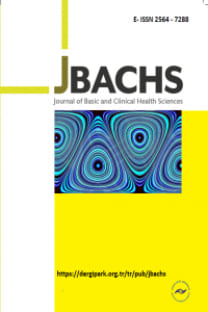Influence of Care Burden-related Factors on Mental Health and Quality of Life of the Caregivers of Dementia Patients
Influence of Care Burden-related Factors on Mental Health and Quality of Life of the Caregivers of Dementia Patients
home care, dementia, family caregiver, quality of life,
___
- References 1. Palm E. A Declaration of healthy dependence: The Case of Homecare. Health Care Analysis, 2014;22(4):385-404
- 2. Karahan A, Güven S. Yaşlılıkta evde bakım, Geriatri Dergisi, 2002;5(4):155-159.
- 3. Bozdemir N, Evde bakım tanımlar ve tarihçe, Aile Hekimliğinde Evde Bakım, Edt. Ünlüoğlu İ, Saatçı E. İstanbul: Akademi Yayınevi, 2015:1-9.
- 4. World Health Organisation Geneva, Home based long term care, World Health Organization Technical reportseries (898), Hong Kong, Singapore: Report of a WHO Study Group. 2000.
- 5. Yılmaz A, Turan E, Gundogar D. Predictors of burnout in the family caregivers of alzheimer's disease: Evidence from Turkey. Australas J Ageing2009; 28:16-21.
- 6. Yaffe K, Fox P, Newcomer R, Sands L, Lindquist K, Dane K et al. Patient and caregiver characteristics and nursing home placement in patients with dementia. JAMA 2002; 287:2090-20.
- 7. Mace NL, Rabins PV. 36 Saatlik Gün: Alzheimer hastalığı ve ileri yaşta bellek kaybı olan kişilerin bakımında hasta yakınları için rehber. Çeviren Nesteren Önür, Yüce Yayınları, İstanbul, 1999.
- 8. 23. Schulz R, Cook TB, Beach SR et al. Magnitude and causes of bias among family caregivers rating Alzheimer disease patients. Am J GeriatrPsychiatry2013;21(1):14-25.
- 9. Novak M, Guest C. Application of a multi-dimensional caregiver burden inventory. The Gerontologist 1989;29(6):798-803.
- 10. Küçükgüçlü Ö, Esen A, Yener G. Bakım verenlerin yükü envanteri’nin türk toplumu için geçerlik ve güvenirliğinin incelenmesi. Journal of Neurological Sciences. 2009; 26(1):60-73.
- 11. Zigmond AS, Snaith PR. The anxiety and depression scale. Acta Psychiatr Scand 1983; 67(6): 361-70.
- 12. Aydemir Ö, Güvenir T, Küey L, Kültür S. Hastane anksiyete ve depresyon ölçeği türkçe formunun geçerlilik ve güvenilirliği, Türk Psikiyatri Dergisi 1977; 280-287.
- 13. Dünya Sağlık Örgütü Yaşam Kalitesi Ölçeği (WHOQOL) , Psikiyatri’de kullanılan ölçekler ed. Ömer Aydemir, Ertuğrul Köroğlu, Ankara, Medicographics Ajans ve Matbaacılık Hizmetleri, 2006.
- 14. Eser SY, Fidaner H, Fidaner C ve ark. Yaşam kalitesinin ölçülmesi, WHOQOL-100 ve WHOQOL-Bref. Psikiyatri Psikoloji Psikofarmakoloji (3P) Dergisi. 1999;7(2)5-13.
- 15. Akdeniz M, Kavukçu E, Yaman A, Howe J, Yaman H. Birincil bakımda yaşlıların bilişsel sorunlarının yönetimi. Sürekli Tıp Eğitimi Dergisi 2010;19(2):3-8.
- 16. Stone R, Cafferata GL, Sangl J. Caregivers of the frail elderly: A national profile. Gerontologist 1987; 27:616-626.
- 17. Atagün Mİ, Balaban ÖD, Atagün Z, Elagöz M, Özpolat AY. Kronik hastalıklarda bakım veren yükü. Psikiyatride Güncel Yaklaşımlar 2011;3(3):513-552.
- 18. Altun İ. Hasta yakınlarının bakım verme rolünde zorlanma durumları, I. Ulusal Evde Bakım Kongresi. 24- 26 Eylül 1998 İstanbul, Türkiye. Kongre özet kitabı Sayfa:71-78.
- 19. Eğilli CS, Sunal N. Demanslı hastaya bakım verenlerin bakım yükü ve etkileyen etmenlerin belirlenmesi. JAREN 2017;3(2):83-91 20. Çetinkaya F.Demanslı hastaya bakım verenlerin bakım yükünün incelenmesi. Ege Üniversitesi Sağlık Bilimleri Enstitüsü, İç Hastalıkları Hemşireliği Anabilim DalıYüksek Lisans Tezi, İzmir, 2008.
- 21. Dura JR, Stukenberg KW, Kiecolt-GlaserJK. Anxiety and depressive disorders in adult children caring for demented parents. Psychol Aging1991;6(3):467-73.
- 22. Ostojić D, Vidović D, Baceković A et al. Prevalence of anxiety and depression in caregivers of Alzeheimer's dementia patients. Acta Clin Croat 2014;53(1):17-21.
- 23. Amieva H, Rullier L, Bouisson J, Dartigues JF, Dubois O, Salamon R. Needs and expectations of Alzheimer’s disease family care givers. Rev Epidemiol Sante Publique 2012; 60:231-238.
- 24. Koca E, Taşkapılıoğlu Ö, Bakar M. Alzheimer hastalığında evrelere göre hastaya bakım veren kişi(ler)nin yükü. ArchNeuropsychiatry 2017;54:82-6.
- 25. Bağ B. Hospis ve hospiste ölüme hazırlanma. Akad Geriatri 2012; 4(3):120-125.
- Yayın Aralığı: Yılda 3 Sayı
- Başlangıç: 2016
- Yayıncı: DOKUZ EYLÜL ÜNİVERSİTESİ
Ladan ESMALİAN KHAMSEH, Mohsen AHMADİ TAHOR-SOLTANİ, Azade SHABANİ, Nasrolah ERFANİ
Gender Differences in Gait Parameters of Healthy Adult Individuals
Sinem SUNER-KEKLİK, Gamze ÇOBANOĞLU, Zeynep Berfu ECEMİŞ, Nevin ATALAY GÜZEL
The Awareness of Healthy Individuals about Attributable Risk Factors of Cancer
İlke KESER, Kadirhan ÖZDEMİR, Hilal UTKAN BERGÜZ, Songül ATASAVUN UYSAL, Sinem SUNER-KEKLİK, Songul BAGLAN-YENTUR, Mukaddes ARAS
Effects of Homeopathic Remedies on Mesenchymal Stem Cell Proliferation: A Methodology Study
Ahu PAKDEMİRLİ, Meral SARPER, Elif Güler KAZANCI
Hyperbaric Pressure Effect on Dental Luting Cements
Secil OZKAN ATA, Nazım ATA, Rıfat UGURLUTAN
Murat TOMRUK, Melda SOYSAL TOMRUK, Orhan KALEMCİ
Merve İPEK ŞIKLAROĞLU, Ayla TUZCU
The Effects of Depressive Symptoms on Healthy Lifestyle Behaviors During Pregnancy
